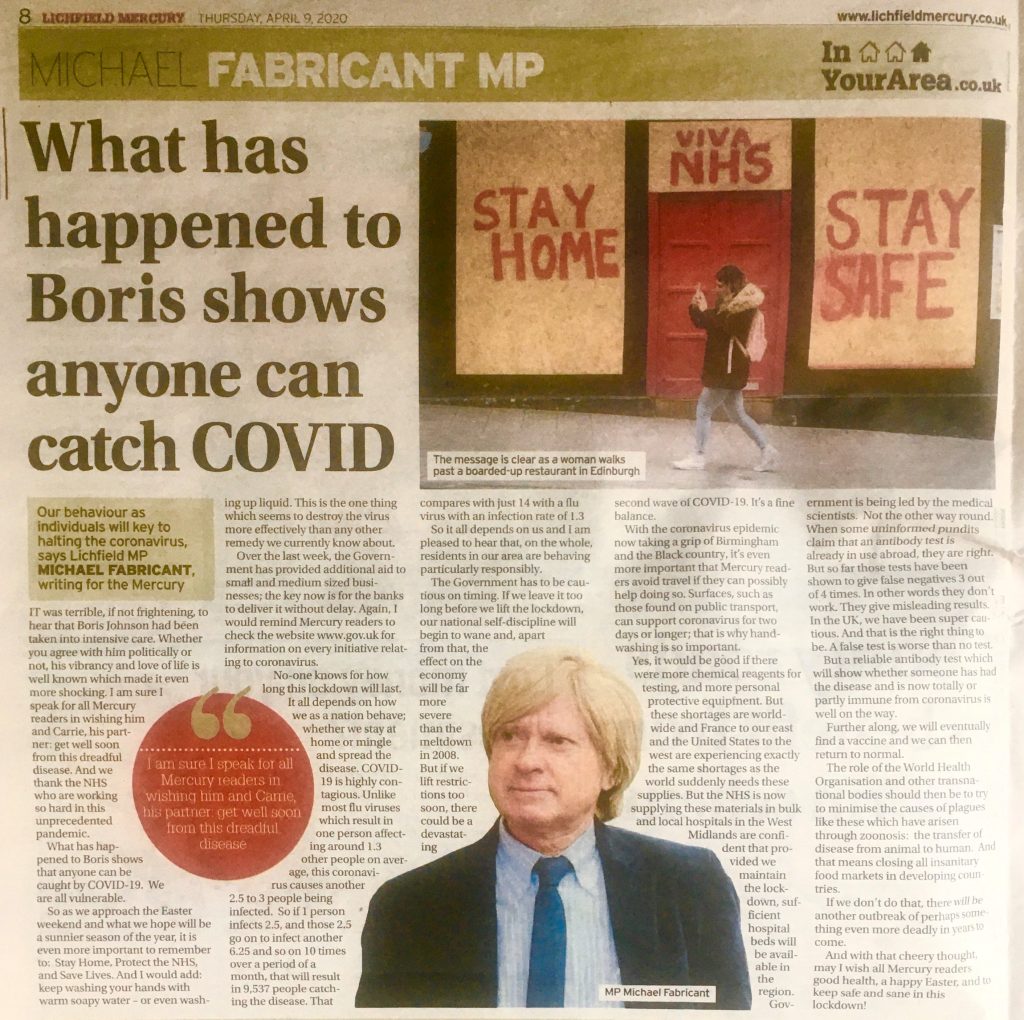Covid-19 Update, Lichfield Mercury
Thursday April 9th, 2020
What has happened to Boris shows that anyone can catch Covid-19.
“Our behaviour as individuals will be key to halting the coronavirus”, says Lichfield MP Michael Fabricant writing for the Mercury
It was terrible, if not frightening, to hear that Boris Johnson had been taken into intensive care. Whether you agree with him politically or not, his vibrancy and love of life is well known which made it even more shocking. I am sure I speak for all Mercury readers in wishing him and Carrie, his partner: get well soon from this dreadful disease. And we thank the NHS who are working so hard in this unprecedented pandemic.
What has happened to Boris shows that anyone can be caught by Covid-19. We are all vulnerable.
So as we approach the Easter weekend and what we hope will be a sunnier season of the year, it is even more important to remember to: Stay Home, Protect the NHS, and Save Lives. And I would add: keep washing your hands with warm soapy water – or even washing up liquid. This is the one thing which seems to destroy the virus more effectively than any other remedy we currently know about.
Over the last week, the Government has provided additional aid to small and medium sized businesses; the key now is for the banks to deliver it without delay. Again, I would remind Mercury readers to check the website www.gov.uk for information on every initiative relating to coronavirus.
No-one knows for how long this lock-down will last.
It all depends on how we as a nation behave; whether we stay at home or mingle and spread the disease. Covid-19 is highly contagious. Unlike most flu viruses which result in one person affecting around 1.3 other people on average, this coronavirus causes another 2.5 to 3 people being infected. So if 1 person infects 2.5, and those 2.5 go onto infect another 6.25 and so on 10 times over a period of a month, that will result in 9,537 people catching the disease. That compares with just 14 with a flu virus with an infection rate of 1.3
So it all depends on us and I am pleased to hear that, on the whole, residents in our area are behaving particularly responsibly.
The Government has to be cautious on timing. If we leave it too long before we lift the lock-down, our national self-discipline will begin to wane and, apart from that, the effect on the economy will be far more severe than the meltdown in 2008. But if we lift restrictions too soon, there could be a devastating second wave of Covid-19. It’s a fine balance.
With the coronavirus epidemic now taking a grip of Birmingham and the Black country, it’s even more important that Mercury readers avoid travel if they can possibly help doing so. Surfaces, such as those found on public transport, can support coronavirus for two days or longer; that is why handwashing is so important.
Yes, it would be good if there were more chemical reagents for testing, and more personal protective equipment. But these shortages are worldwide and France to our east and the United States to the west are experiencing exactly the same shortages as the world suddenly needs these supplies. But the NHS is now supplying these materials in bulk and local hospitals in the west midlands are confident that provided we maintain the lock-down, sufficient hospital beds will be available in the region.
Government is being led by the medical scientists. Not the other way round. When some uninformed pundits claim that an antibody test is already in use abroad, they are right. But so far those tests have been shown to give false negatives 3 out of 4 times. In other words they don’t work. They give misleading results. In the UK, we have been super cautious. And that is the right thing to be. A false test is worse than no test.
But a reliable antibody test which will show whether someone has had the disease and is now totally or partly immune from coronavirus is well on the way. Further along, we will eventually find a vaccine and we can then return to normal.
The role of the World Health Organisation and other transnational bodies should then be to try and minimise the causes of plagues like these which have arisen through zoonosis: the transfer of disease from animal to human. And that means closing all insanitary food markets in developing countries.
If we don’t do that, there will be another outbreak of perhaps something even more deadly in years to come.
And with that cheery thought, may I wish all Mercury readers good health, a happy Easter, and to keep safe and sane in this lock-down!

